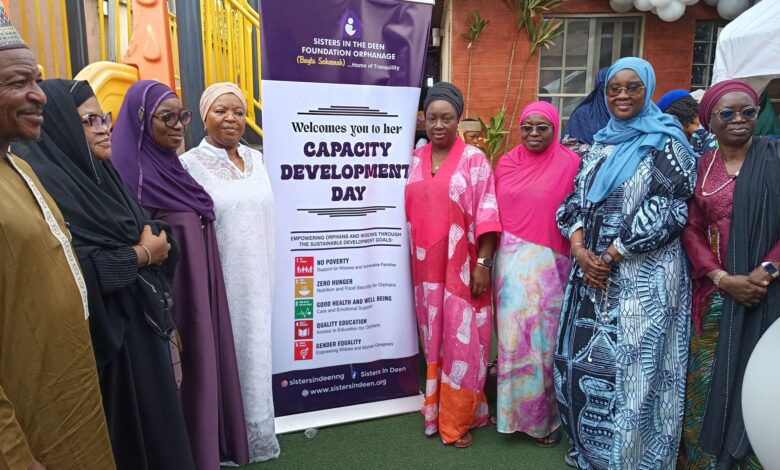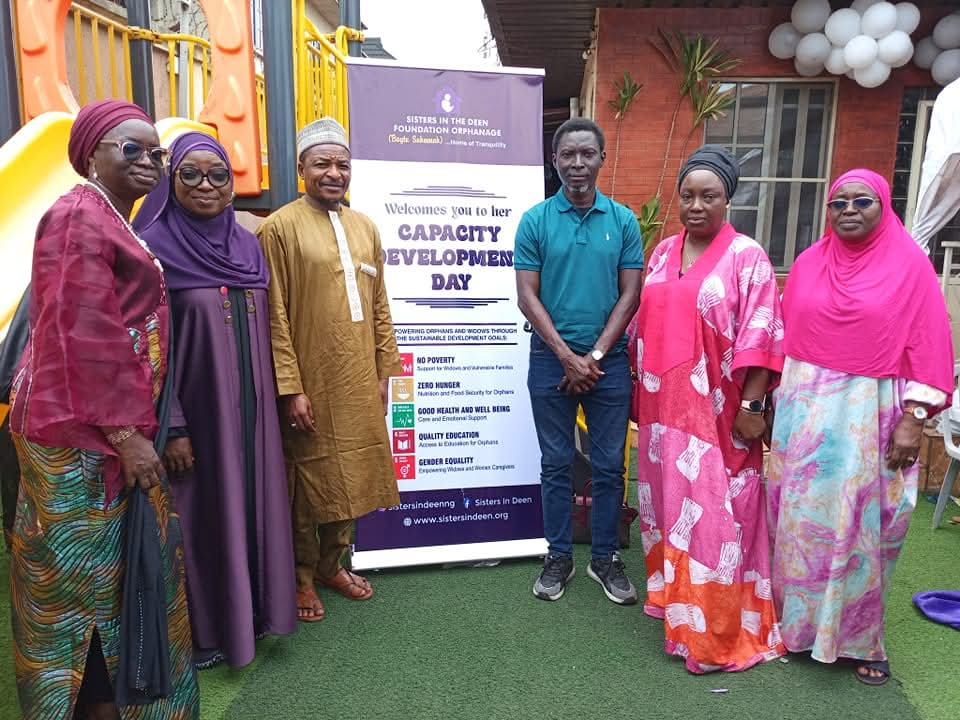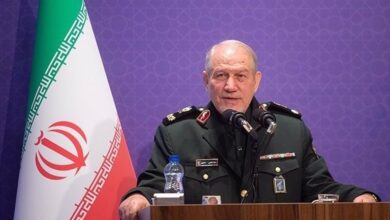Justice Solebo, Dr. Olajobi, Saheed-Adebambo speak as SIDF hosts capacity building for orphans, vulnerable youths

By BASHIR ADEFAKA
“When it comes to time and everything that we even give more because our motivation is the Hadith of the prophet (SAW) that say, “I and the custodians of orphans will be like this in Jannah” raising two fingers. So we don’t want to lose out from Jannah. So that’s why everything that concerns orphans is what we do as Sisters In Deen Foundation,” said Dr Nurat Akinlabi-Babalola, President of Sisters In Deen Foundation.
The Sisters In Deen Foundation has successfully conducted its 4th Annual Capacity Development for Orphans and Vulnerable Youths, held at the Baytu Sakeenah Orphanage Home in Lagos. Emphasizing the importance of nurturing resilience and inspiring hope, this year’s event reaffirmed the belief that vulnerability is not a weakness but rather a stepping stone toward success.

The event commenced with an engaging “Icebreaker & Psychotherapy Session” at 9:00 AM, where participants were welcomed through an accreditation process that set the tone for the day. Highlights of the program included empowerment talks, fun activities, and awards to recognize the accomplishments of the children.
The three distinguished speakers, who physically and personally attended and addressed the audience, are Honourable Justice Sherifat Solebo, Mrs. Modupeola Adebambo, Chairman of the National Association of Nigeria Social Workers, Lagos State Chapter, and Dr. AbdulFatai Olajobi, a practicing medical doctor in Lagos.
Justice Solebo delivered a powerful keynote address that emphasized the importance of resilience and strength, reassuring attendees that their current hardships do not define their future. She assured young girls that they are not powerless in the face of adversity, saying, “Nobody has the capacity to kill you if you have been inappropriately touched,” and encouraging them to report instances of abuse through shared toll lines for rape and domestic violence.
Addressing societal issues, she chided divorcing couples for neglecting to consider the future of their children during such tumultuous times, urging all adults to prioritize the well-being of children.
Dr. Nurat Akinlabi-Babalola, President of the Sisters In Deen Foundation, opened the session with heartfelt remarks, stating, “Your situation today is not the end of your chapter.” She highlighted the importance of the event, which aims to let children know that they matter and that their vulnerabilities do not dictate their potential for success.
Speaking to journalists, the SIDF president said, “First of all, I want to thank Allah subhaanau wa ta’ala, the Lord of the world for guiding us. I do say something that, Baytu Sakeenah is the baby of the ummah. Allah just used us to bring it to life. So, what we created this is after care evaluation of the work we do. We realized that, without empowering these youths, without empowering these children, the work will actually be in vain.
“And we realized that there are innovators among them. There are leaders among them. The only thing they need is just that nudge. They need that support, and they need that empowerment for them to grow and close up into who Allah has destined them to be.
“So, we can’t do this work without capacity. We can’t do this work without counselling. We can’t do this work without bringing real life situation for them to learn and grow. You realize that when we started this, this is the 4th edition of capacity building by Sisters In Deen Foundation for the Vulnerable Children. When we started with therapeutic session, we realized that coming from different alternatives apart from our own, we asked them, “go and do this”, “Oya, wash your hands.” Some of them would be sluggish and all of that. They won’t get to actually feel the impact of the talk.
“So we had a therapeutic session, where they had fun, they were able to explore, they turn up. They do everything. When it comes to orphans and vulnerable children, as Sisters In Deen Foundation, we don’t want to lose that to anything in the world. So, that is why we do what we do, because we are building leaders, as we are building generation. So, that’s why we are here,” said Dr. Nurat Akinkabi-Babalola.
Baytu Sakeenah Orphanage Home has been generally appraised to be a home better than home. Speaking on this, Dr. Nurat Akinlabi-Babalola said, “I would say this that, even my sisters, when we talk sometimes, say “We even give more than what we give in our homes.” Do you understand?
“When it comes to time and everything that we even give more because our motivation is the Hadith of the prophet (SAW) that say, “I and the custodians of orphans will be like this in Jannah” raising two fingers. So we don’t want to lose out from Jannah. So that’s why everything that concerns orphans is what we do as Sisters In Deen Foundation.
Mrs Basirat Oladosu, Welfare Officer of the Sisters In Deen Foundation, speaking on how she managed affairs of organization of that nature, said, “Well, I’ll say with the help if Almighty Allah, i’ve been able to manage the organization as well as the children. I’ve been of care. By this I mean, their welfare, their care, their schooling, everything that includes their welfare and their health. Their feeding, and everything. I’m the one in charge. And with the help of almighty Allah and with good hands that are with me. I mean the staffs as well as other sisters. The exco members, and the trustee members. We’ve been able to achieve that.
“Yes, we give our children here, as well as the staff, top notch care. We have them registered with the Lagos State facility program, ILERA EKO. So we are registered and we also have a private hospital nearby whereby we have them registered, in case maybe the facility required of the kind or the kind of health care required cannot be met at the public hospital. We also have agreement with a private hospital nearby.”
Talking about the integration of the children into the society, the SIDF welfare officer said, “I would say a couple of them have left already. And they are already reunited with their families. So, it is decision I’ll say is not for all of us to unite them at a particular time. That lies with the government, whenever the court gives us the order because the order to be in charge comes from the court. Whenever the court gives us the order to release them, we release them and we follow up.
“We have a child presently with child rehabilitation center male section in Oregun. We are still in charge. We often go there on visitation to see the child. We’re still responsible for his schooling up till now. And some that are reunited with their family we still make calls to check on them and make sure how well they are doing. And we tell them, “anytime you want us to come in, you are always welcome” because they are one of us.”
On the kind of individuals the Foundation wants the children to be and how it is rewarded when they are leaving, she said, “Yes, we strive to make them complete citizens. Complete ambassadors of our precious and prestigious school. So, that’s what we keep telling them when they are with us and that’s what we strive to make them. So that when they can be able to face the challenges from the outside. Both spiritual, academically, everything. All rounder.”
Talking of the welfarism of the children and challenges faced, “I’ll say we face a lot of challenges because they all come from society diverse upbringing and all of that. So we face a lot of challenges, but the moment they are here with us, we try to inculcate our own system into them and we bring them up our own style.”
All the three speakers lauded the Sisters In Deen Foundation for their ongoing commitment to the welfare of orphans and vulnerable youth, describing their efforts as not only beneficial for the individuals they serve but also for the betterment of society as a whole.
They collectively underscored the notion that the foundation’s work is in alignment with the teachings of Prophet Muhammad (peace be upon him), emphasizing how those who care for orphans will be rewarded in the hereafter.
Addressing journalists after the event, Justice Sherifat Solebo spoke on social vices “afflicting the society and, of course is ravaging our youths and the community. That’s why I enjoyed the opportunity to speak to the children to highlight the different social vices, how they can be involved and how they can curb it.
“And, of course, I spoke to parents because “, according to her, they lag behind in their responsibilities, duties and others. “So, once we go back to the words of God and do things the way we used to do, a lot of the young addicts in the streets that look line and people will be off, stealing and all the crimes we be reduced drastically and we will be better for it inshallah.”
Speaking about extra court effort on the part of judges to help reduce social vices in the society, Justice Solebo said, “As judges we are policy makers. Part of the training is that we speak with these children. You can see from the examples I gave that it was through interactions speaking to them that we extracted from as to what led them to bad company and what they did. So, as judges, we are not police, our own is just to apply the law.
On the role of government, she said, “We have what is called rights of children. One of it is right to education. Government must provide the tree education up to JSS 3 level. If the government is able to do that, a lot of these children like I pointed out will be educated.”
A medical doctor and psychotherapist, Dr. AbdulFatai Olajobi, said, “I’ve been invited to talk to the children about having bold dreams, being courageous, and having character for their future and for their life. So the talk is meant to be about, not thinking because they are vulnerable, they are orphans or deprived kids. So, they can be anybody. They can be president, they can be lawyer, doctor, farmer, journalist, accountant, whatever they want to be. And it actually from the fact that it is supposed to be an energizer for success. There’s no great person that you’ll see that has not gone through some kind of pain. No pain, no gain.
“You see that a lot of rich kids are not likely to get rich like their parents. They don’t get as successful as their parents. It’s people that feel things that have lacked in the past that think, “Ha, I want to have. I don’t want to lack when I grow up.” So they work hard. But the people that have tend to feel relaxed and have no reason to work hard. That’s why you see a child of a rich person is not likely to be as rich as that person. Except that person deprives him when he doesn’t allow him to have all the luxuries that he had because, most rich people, in Yoruba, they’ll say, “atapata dide” (meaning: people with poor background).
“A lot of people are like that. They struggled from not having to having. A lot of people that have, growing up, they don’t appreciate it. So, when they talk to them that anything they want to be, they can be. What you are now shouldn’t determine what you are meant to be. What you will be should be what will determine what you want to be.”
According to Dr. Olajobi, “Because they are vulnerable, meaning that people can be cheated, but they can get their right and what they want. They may not be able to get life the way they want, but the ways others have it. So the talk is for them to see that, when you’re down, you need to fear no fall. What you can do is to go up. And what you should do is to look up and look at some stories. Already, Justice Solebo told them some stories about people that struggled. Nelson Mandela had struggled, MKO Abiola had struggled, in fact, other stories all around the world of people who struggled and they still became successful.
“So, that’s what the theme is all about. That they think there’s a probability that people who are less or who have not been exposed are not privileged. They have been deprived. They can still be whatever they want to be,” he said.
Also fielding questions from journalists after the event, Mrs. Modupeola Adebambo, Chairman of the National Association of Nigeria Social Workers, Lagos State Chapter, said, “Well, I’m here again this year, to talk to children about the sense of thoughtfulness. Children are very important and at every point, we must let them know how important they are by helping them to build their self confidence, their sense of self worth, and their ability to move forward and become responsible adult in the future.
“So today, I spoke to them about overcoming their fears, about pushing resilience, support of adults or elders in their lands. Because, if we do not exercise on these things, children are likely to be influenced by external factors or external persons that do not mean well for them. So it is important that we continue to let them know that the first people they should put in when they are having challenges or when they have is for them to go to significant adults in their lives. And in this instance is being carers…
“Now we also need to let them know that it Is okay for them to make mistakes but what do they do after they have realized that it was a mistake. It is very important that they own their mistakes. You know, take steps towards correcting those mistakes and learn their lessons for those mistakes so that they do not make those same mistake in the future. That’s the bottom line,” he said.
The end of the event served as a resounding reminder that vulnerability is not synonymous with defeat. Instead, it can be a catalyst for growth and a pathway to success.
The Sisters In Deen Foundation continues to play a vital role in empowering young lives, providing them with the tools needed to overcome their circumstances and achieve their dreams.
This impactful occasion illustrated a collective commitment to transform the lives of vulnerable youths, reinforcing hope and determining a shared mission toward a brighter future.









